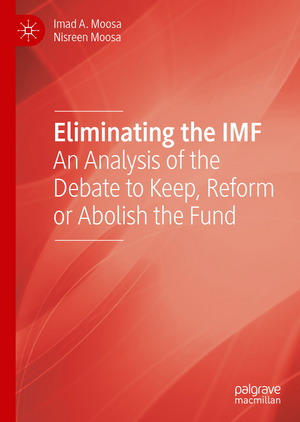Eliminating the IMF: An Analysis of the Debate to Keep, Reform or Abolish the Fund
Autor Imad A. Moosa, Nisreen Moosaen Limba Engleză Hardback – 21 feb 2019
Preț: 582.80 lei
Preț vechi: 685.65 lei
-15% Nou
Puncte Express: 874
Preț estimativ în valută:
111.52€ • 116.43$ • 92.30£
111.52€ • 116.43$ • 92.30£
Carte tipărită la comandă
Livrare economică 05-19 aprilie
Preluare comenzi: 021 569.72.76
Specificații
ISBN-13: 9783030057602
ISBN-10: 3030057607
Pagini: 198
Ilustrații: XV, 178 p. 9 illus.
Dimensiuni: 148 x 210 mm
Greutate: 0.39 kg
Ediția:1st ed. 2019
Editura: Springer International Publishing
Colecția Palgrave Macmillan
Locul publicării:Cham, Switzerland
ISBN-10: 3030057607
Pagini: 198
Ilustrații: XV, 178 p. 9 illus.
Dimensiuni: 148 x 210 mm
Greutate: 0.39 kg
Ediția:1st ed. 2019
Editura: Springer International Publishing
Colecția Palgrave Macmillan
Locul publicării:Cham, Switzerland
Cuprins
1. The IMF: History, Functions and Operations.- 2. Neoliberalism as the Fund’s Ideology.- 3. The IMF as an Instigator of Riots and Civil Unrest.- 4. The Effects of IMF Operations on Social Expenditure.- 5. Arguments for Keeping or Reforming the Fund.- 6. Arguments for Abolishing the Fund.- 7. Concluding Remarks.
Notă biografică
Imad A. Moosa is a Professor at RMIT, Australia. He has held several academic, professional and advisory positions in the UK, US and Australia, and he has written extensively on both economics and finance. Over the course of his career, he has published over 200 papers and 22 books, 11 of which were published with Palgrave.
Nisreen Moosa is a clinical health scientist who has turned into a health economist. She is completing her PhD on the financing of healthcare at the University of South Australia. Part of her research is on the effect of the IMF on health expenditure, particularly in developing countries.
Nisreen Moosa is a clinical health scientist who has turned into a health economist. She is completing her PhD on the financing of healthcare at the University of South Australia. Part of her research is on the effect of the IMF on health expenditure, particularly in developing countries.
Textul de pe ultima copertă
This book offers a concise but thorough analysis of the International Monetary Fund reform debate. Since the advent of the Asian financial crisis in the late 1990s, a lengthy deliberation has ensued over whether the IMF should be reformed, abolished, or left as is. The authors approach this debate from a normative perspective while looking at arguments from all sides, as well as reflecting on the history, functions, and ideology of the IMF. This unique approach gives weight to the authors’ perspectives and their conclusion that the IMF ultimately does more harm than good. Written to analyze and contribute to the current IMF debate, this Palgrave Pivot is a must-read for scholars and policymakers invested in the conversation surrounding IMF reform.
Caracteristici
Explores specific examples of how IMF operations have been detrimental to the welfare of people in developing countries Considers arguments for keeping, abolishing, and reforming the IMF Features criticisms of the IMF from both the left and right sides of the political spectrum
